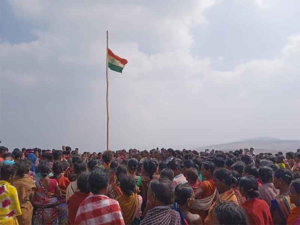Stating that the farm laws introduced by the Narendra Modi government have “no check against exploitation of the farmer”, the Rajasthan assembly on Saturday introduced The Farmers’ Produce Trade and Commerce (Promotion and Facilitation) (Rajasthan Amendment) Bill, 2020, The Farmers (Empowerment and Protection) Agreement on Price Assurance and Farm Services (Rajasthan Amendment) Bill, 2020, and The Essential Commodities (Special Provisions and Rajasthan Amendment) Bill, 2020, to nullify the effect of the central Acts in the state.
With this, Rajasthan has become the third Congress-ruled state to counter the Central farm bills. The Punjab assembly had earlier unanimously passed such farm Bills. Chhattisgarh too has passed an amendment Bill.
The Rajasthan Bills have substantially altered the restrictions imposed under the Central Acts on the application of a market fee by the state APMCs, and power to regulate production, supply, distribution and stock of agricultural produce under extraordinary circumstances and the dispute resolution process.
In The Farmers’ Produce Trade and Commerce (Promotion and Facilitation) (Rajasthan Amendment) Bill, 2020, the major amendment has been about levying a market fee in a “trade area” provided under the state APMC Act. This is a U-turn from the Central Act, The Farmers’ Produce Trade and Commerce (Promotion and Facilitation) Act, 2020, in which the imposition of a market fee in a “trade area” under the state APMC Act or any other law was prohibited.
Section 2(m) of the Central Act defines “trade area” as “any area or location, place of production, collection and aggregation including: (a) farm gates; (b) factory premises; (c) warehouses; (d) silos; (e) cold storage; or (f) any other structure or places, from where trade of farmers’ produce may be undertaken in the territory of India.”
The same definition has also excluded: “(i) physical boundaries of principal market yards, sub-market yards and market sub-yards managed and run by the market committees formed under each state APMC Act; (ii) private market yards, private market sub-yards, direct marketing collection centres, private farmer consumer market yards managed by persons holding licences or any warehouses, silos, cold storage or other structures notified as market or deemed markets under each state APMC Act in force in India.”
This meant “trade area” included any place outside the APMCs. Without altering the definition of “trade area”, the Rajasthan government through its bill is all set to impose a market fee on the trade of agricultural produce outside the APMCs – something that was vehemently prohibited in the Central Act.
In fact, the changes made in the Bill restore the provisions of the state APMC Act. Under the Rajasthan Agriculture Produce Markets Act, 1961 (Rajasthan APMC Act), a market fee was imposed on produce brought or sold in a “market area”, set at a maximum of Rs 2 per Rs 100 worth of agricultural produce. (Market area under the original Act is defined as any area, other than the principal market yard and sub-market yard, declared by the state government to be a market area.)
Another change proposed in the Bill is about the dispute resolution process. The Central Act had provided that the sub-divisional magistrate (SDM), upon receiving an application, shall refer the dispute to the conciliation board. Upon failure to settle the dispute, the SDM will summarily decide within 30 days. If the parties are aggrieved by SDM’s order, they may make an appeal to the collector.
However, the Rajasthan Bill amended this to provide dispute resolution under the state APMC Act, which says disputes are to be settled by the market committees.
In The Essential Commodities (Special Provisions and Rajasthan Amendment) Bill, 2020, the Rajasthan government has given itself the power to regulate or prohibit the production, supply, distribution and imposition of stock limits of foodstuffs, including cereals, pulses, potato, onions, edible oilseeds and oils, under extraordinary circumstances such as famine, price rise, natural calamity or any other situation, if there is 100% increase in retail price of the horticulture produce or 50% increase in the retail price of non-perishable agricultural foodstuffs.
In the Central Act, The Essential Commodities Act, 2020, the regulation of essential commodities and imposition of stock limit was also provided if there is 100% increase in retail price of horticulture produce or 50% increase in the retail price of non-perishable agricultural foodstuffs. However, the Central government while delegating these powers to the state government made prior concurrence of the Central government mandatory.
In the Farmers (Empowerment and Protection) Agreement on Price Assurance and Farm Services (Rajasthan Amendment) Bill, 2020, the state provided that sale or purchase of a crop under contract farming will be allowed only at minimum support price or above it.
In the Central Act, The Farmers (Empowerment and Protection) Agreement on Price Assurance and Farm Services Act, 2020, the sale and purchase of a crop under contract farming is provided at a price determined and mentioned in the farming agreement. It must be noted that in the Rajasthan APMC Act and APMC Rules, the farming agreement was also provisioned at a price either higher than the MSP or the model price, whichever is higher.
The Rajasthan government has also provisioned in the Bill that the farmer produce shall be liable to fee under the state APMC Act in matters of the farming agreement. This is contrary to the Central Act, where farmer’s produce under contract farming was exempted from application of fee under the state APMC Act.
However, under the Rajasthan APMC Act, a market fee was being charged on agricultural produce under the contract farming agreements which was a maximum of Rs 2 per Rs 100 worth of agricultural produce.
The Rajasthan government, through the Bill, has also empowered itself to enforce the stock limit of any agricultural produce under the farming agreement, if it is facing shortage in the state or prices have gone beyond 25% of the maximum price prevailing in the market within two years immediately before passing of the order by the state government. In the Central Act, no obligation on a stock limit is applicable to farm produce under a farming agreement.
Another change in the Bill has been with respect to the dispute resolution process. The Bill provides that disputes will be taken to market committees. If aggrieved by its decision, the party may prefer an appeal to the director within 30 days. This is the same as provided in the Rajasthan APMC Act.
In the Central Act, it said that disputes will be taken to the conciliation board specified in the farming agreement. Upon failure to settle the dispute by the conciliation board, the party may approach the SDM. The appeal of the SDM’s decision would lie before the collector.
Apart from this, the Rajasthan Bills also provide for punishment for traders found harassing farmers.
(Shruti Jain is a reporter at The Wire. Article courtesy: The Wire.)




